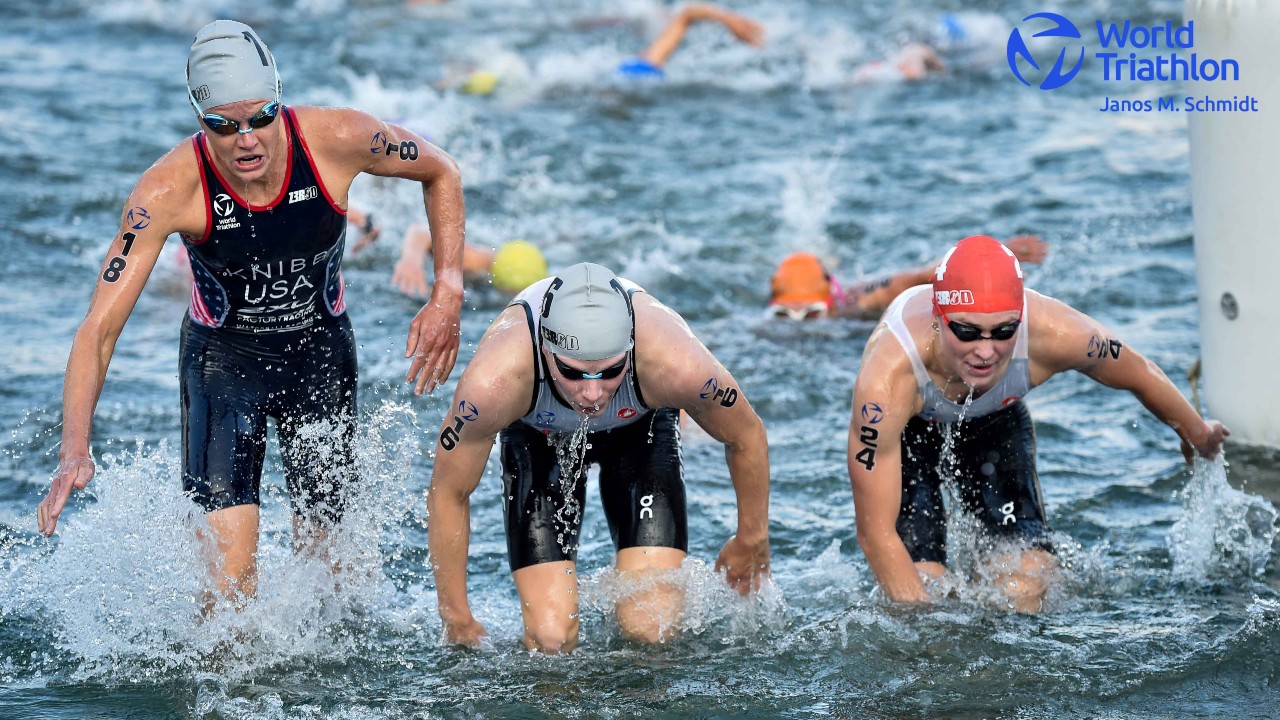In a statement released early on Friday March 8, World Triathlon announced that due to adverse weather conditions, the first event of the 2024 World Triathlon Championship Series in Abu Dhabi would be cancelled.
The event, which also included mixed team relay, para and age-group races, becomes the latest triathlon to be severely impacted by climate issues over the past 12 months, as instances of extreme weather continue to increase around the world.
As the consequences of global warming continue to be felt more acutely in our day-to-day lives, what role can triathlon and the wider sporting industry play in tackling the issue? We examine the situation and offer some tentative suggestions below.
How is climate change impacting triathlon races?
Despite being the wettest month of the year in Abu Dhabi, the average rainfall in March is just 13mm. According to local news channels, the Emirate is expected to experience more than 13mm of rain, the average amount of rain in a month, this weekend alone.
In 2023, a wide variety of extreme weather conditions caused the cancellation or curtailment of events. In Canada, wildfires in multiple provinces meant both IRONMAN 70.3 Mont-Tremblant and IRONMAN Canada were cancelled, with the mixed team relay at WTCS Montreal also called off.

Unprecedented amounts of rainfall, which severely impacted the water quality at the races, was the main factor in the cancellation of the swim at the European Triathlon Championship in Madrid and the Paris Test Event last year.
In the UK, high winds and heavy rain in July led to the removal of the bike leg at the World Triathlon Para Series in Swansea. Whilst Wales isn’t known for its glorious sunshine, the frequency of such extreme events over the past 12 months is becoming harder to ignore.
With doubts already resurfacing about the River Seine’s suitability for swimmers at this summer’s Olympic Games, and the WTCS returning to Montreal in September after Canada’s record-breaking wildfire season in 2023, the chances that Abu Dhabi will be the last race impacted by extreme weather in 2024 looks unlikely.
Does triathlon have a sustainability issue?
As is being made increasingly clear by organizations ranging from the United Nations to NASA and the Met Office, climate change and global warming increases the frequency and intensity of extreme weather events.
Given the fact that climate change is primarily caused by human activities, triathletes and triathlon as a sport has a role to play in mitigating these extreme weather events by reigning in their emissions.
Olympic Champion Flora Duffy, who in January released the reports of a Carbon Footprint Assessment, demonstrated the outsized impact professional athletes, including triathletes, have on the environment.
Despite driving an electric vehicle and fitting her homes with solar panels, Duffy reported that “my impact is 10x that of a regular person in a developed society” due largely to her travel to races and consumerism.
With hundreds of professional short course triathletes competing around the world each year, some of whom may not be as environmentally conscious as Duffy, it is alarming to think of the disproportionate impact this small percentage of pros have.
Obviously, triathletes and professional sportspeople are not solely to blame for the degradation of the environment. Most likely, the world’s triathletes in a lifetime couldn’t amass the daily emissions of the fossil fuel industry. However, that does not abscond us from responsibility.
What can be done?
Since World Triathlon is currently looking for a Sustainability Manager, they may currently be behind the curve when it comes to actively engaging with climate change discourse.
However, given their current expansion of the racing calendar, plus their new partnership with the PTO creating yet another race series requiring significant global travel, the international governing body needs to step up when it comes to the environment.
For starters, the triathlon calendar should be streamlined, not expanded, with a clear and universal pathway for national athletes to compete on the world stage a sensible first step to reduce the number of athletes travelling to far-flung locations to earn points for the biggest races.
Encouraging national federations to incentivize their best athletes to race at home, which would strengthen domestic fields, is one step. Another, more extreme measure, would be to limit Continental Cups to athletes from that region, preventing pros from cherry picking races with weaker fields in Africa and Asia to improve their ranking.
Another suggestion, given Europe’s status as a triathlon hub, is to persuade athletes to use the continent’s railway infrastructure to travel to races or training camps. Subsidizing these trips, or concentrating races around major railway hubs, could be a constructive way to do this.
Fortunately, there are a number of straightforward ways in which triathlon can do better. World Triathlon, but also organizations such as the PTO, IRONMAN, Challenge and supertri, given their status and resources, have ways in which they can play a key role in shaping the sport’s values as it looks to become more sustainable. But they need to act now.
>>> Read full article>>>
Copyright for syndicated content belongs to the linked Source : Tri247 – https://www.tri247.com/triathlon-news/elite/wtcs-abu-dhabi-triathlon-race-impacted-extreme-weather-climate-change?utm_source=rss&utm_medium=rss&utm_campaign=wtcs-abu-dhabi-triathlon-race-impacted-extreme-weather-climate-change